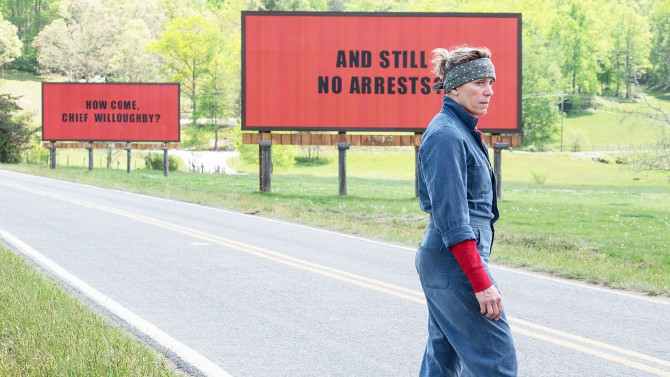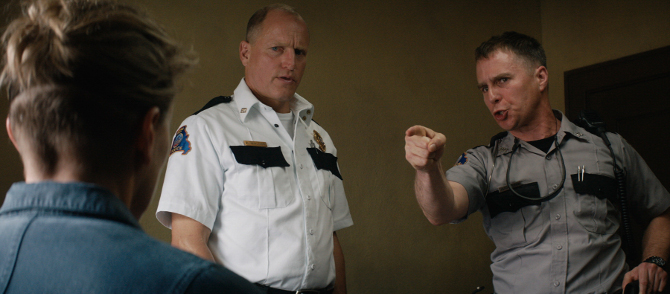“All this anger, man, it just begets greater anger.”
Good things come in threes – case in point, Martin McDonagh’s Three Billboards Outside Ebbing, Missouri. His third full length feature, it has earned him his first Best Picture nomination at the Academy Awards (expected to be one of the frontrunners this year), while the motion picture has also garnered its three main performers Best Actress/Supporting Actor nods, and, though it may be a tad of a stretch, when eliminating the four above mentioned Oscar nominations, it has also earned three other chances for the elusive statuette (for Original Score – Carter’s Burwell’s composition brimming with mysterious western melancholy; Original Screenplay; and Film Editing). Interestingly, the film could very well have had another title, “Three Letters from a Sheriff in Ebbing, Missouri” – but more on that later.
Bringing to life another fascinating dark premise, McDonagh scribes a heart-wrenching tale of how human beings deal with anger, loss, hate, guilt, grief, injustice, and the seemingly cruel fate of life, yet, as always, combined with his sharp wit – a rare movie that, despite its pitch black subject matter, will have you laughing on and off throughout, much like his earlier gems, 2008’s In Bruges and 2012’s Seven Psychopaths.
Our protagonist is divorced single mother Mildred (Frances McDormand), a woman whose heart is soot black following the rape and murder of her daughter, Angela (Kathryn Newton). Wallowing in a world of melancholy and unanswered questions (no word from the Police Department for months), she has a brilliant, though controversial idea – to rent out three billboards on the outskirts of her hometown of Ebbing, Missouri to oppugn their investigation. They read (on a blood red backdrop): “RAPED WHILE DYING”, “AND STILL NO ARRESTS”, “HOW COME, CHIEF WILLOUGHBY?”. This bold action does not help her son, Robbie (Lucas Hedges), cope with the heinous crime, as he is further pointed out and bullied by fellow students.
As with all of McDonagh’s scripts, expect the unexpected, as his characters have richly woven arcs that will surprise and engage. One of said personas is Willoughby (Woody Harrelson), a character that would often fall into the stereotypical position of being a crooked brute, instead, the man, though obviously discouraged by Mildred’s position and manouevre, handles things with a surprising amount of grace. A man with a loving wife, Anne (Abbie Cornish), and two young daughters, the townsfolk are dismayed at the lack of respect Mildred is showing him, especially as he is dealing with terminal pancreatic cancer. A visit from Father Montgomery (Nick Searcy) will give the audience a crystal clear view on much of the communities’ position, as well as Mildred’s unwavering perspective.
To further complicate things, Willoughby must also contend with one of his officers, Dixon (Sam Rockwell), a dim-witted, wild card policeman who acts before thinking – the folks in Ebbing whisper about how he tortured a black man in custody a while back. He is the antithesis of his superior, as well as Desk Sergeant Connoly (Zeljko Ivanek), a steady footed, by-the-book type.
Feeling like an authentic living, breathing community, multiple characters flit in and out of the narrative in intriguing ways. There is Red Welby (Caleb Landry Jones), the unfortunate soul to have rented the billboards to Mildred – becoming the most recent target of Dixon; as well as his less than bright assistant, Pamela (Kerry Condon). Then, there is Mildred’s friend and coworker, Denise (Amanda Warren), a sympathetic soul whose unwavering allegiance places her in a less than comfortable position. The wonderful Peter Dinklage makes the rounds as James, an alcoholic midget who has a crush on Mildred. Juxtaposing this, Mildred’s ex-husband, Charlie (John Hawkes), is an abusive man wallowing in his own quagmire of despair – he fills his life with the much younger Penelope (Samara Weaving), a perky zoo worker who has the maturity and attitude of a tween. Shaking up the Force, an experienced African American officer named Abercrombie (Clarke Peters) is sent to pick up the pieces after a shocking event, a change of pace that seems like it could jolt the Ebbing unit into a new, more positive direction. Momma Dixon (Sandy Martin) also plays a key character, a signpost as to where the officer has come from and why he has fallen into a frustrating rut of anger. Finally, there is an out of town drifter (Brendan Sexton III), a bar hopper who fits into the fabric of the community.
A study in violence and cursing, McDonagh demonstrates the ways in which to utilize such things without feeling exploitative and cheap. Three Billboards really is a film of clashes – murder, divorce, racism, pain and lack of understanding each playing their part in driving characters into the violent abyss. At one point, Mildred is brought into the station for questioning by Willoughby– a scene that switches on a dime, it shows the skills of the pair, as the sequence transitions from sharply pointed anger to something very different in a split second. Similarly, friction between Mildred and her ex is almost always at a tipping point, as if the only respite may be found for a short time while in the eye of the storm. Though it is this hatred that permeates the entire piece, it is what each person does with it that decides their fate. Will they be able to channel it for good, finding some way to look inward and find solace and redemption, or will they continue down a road to perdition? It is the sickly Sheriff that perhaps best understands the preciousness of life and finding a way to enjoy each day, even when it is unfair. He writes three lengthy, insightful letters – to his wife, Mildred and Dixon, each taking a retrospective gaze backward and astute look forward. . . a guiding light from someone with an alternate perspective.
One of the best films of the year, Three Billboards Outside Ebbing, Missouri is simply a masterclass example of writing, directing and acting. Though each actor deserves his or her own praise, it all comes down to the three leads – McDormand, Rockwell, and Harrelson. McDormand anchors the entire picture, her depiction of a tortured soul second to none. She is raw, real, funny and flawed, every snarl, smile and moment of weakness alive in its gritty realism. It is amazing that she can be both sympathetic and callously unlikable at the same time. Rockwell perhaps has an even better arc than McDormand, surprising in how things change from the beginning. Pudgier than normal, he makes us believe that this man’s ire is thriving – racism and hatred coursing through the yokel’s veins. Yet, hitting every note of dialogue to perfection, his less than intellectual persona is chock full of comedy as well – a transcendent milieu to achieve. Harrelson is the movie’s heart, his love for his community, as well as the compassion and humour that beams from his aura despite battling cancer and dealing with an unsolved murder, inspiring. Further enlivening things, McDonagh’s script and actor driven direction brings each dramatic and comedic note to life (you will know exactly what I mean as you watch the scene where Dixon reads his letter from Willoughby). With subtle homages to Nicolas Roeg’s Don’t Look Now (not only is it referenced and heard in the film, but they also share grief as a theme, utilize red as their key accent colour and have several other similarities), this highly original tale also pays tribute to the traditional western (McDormand was inspired by John Wayne, whilst Rockwell looked to Lee Marvin in The Man Who Shot Liberty Valance as a man who would be “the exact opposite” of Mildred) and anti-hero films of the 1970s. To close, I’d also like to suggest that people should listen closely to the final conversation between Dixon and Abercrombie, as, in my mind, it very well could intimate something more sinister than most critics have suggested in their synopsis and reviews. So, don’t express any reservations about visiting this brilliant motion picture, it will have you bragging about it long after the trip is over.



I can’t wait to see this movie – thanks nik had no idea it was same guy as In Bruges
What a great movie- seamless story, fabulous acting; one of those movies that feels so real. I do love Martin McDonagh’s dark subject matter with humour littered throughout. In Bruges is one of my favourite films so no surprise that I like this one so much. Two enthusiastic thumbs up.